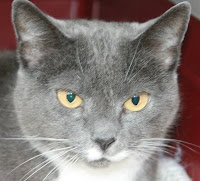 Dear George
Dear GeorgeI spend a lot of time hunting in the nearby hedges, in the village were I live. I brought a mouse home yesterday through the cat flap and there were shrieks as it slipped out of my mouth in the kitchen. My humans don't seem to like the fact that I go hunting almost every day. Yet it's the activity which gives my whole life its joy and meaning.
Yorkshire Patch
Dear Patch,
We all have difficulties with our humans about this one, - that is if we live in a nice family home rather than a barn or stables. Humans like the idea that we keep down the mice numbers but they are also queasy about seeing us doing it. Humans are dreadful hypocrites on this issue.
A few thousand years ago, we noticed that humans needed cats. Indeed mice are the cause of the cat-human relationship. They had started growing grain and building granaries and we moved in. Soon we saw that humans would be better off if we domesticated them, so we moved further into their homes and the close cat-human relationship was off and away.
However domesticated they are, humans like us don't seem to have lost the killing instinct. Their instinct is worse than ours. We kill mice and usually eat them. They kill each other. That is unimaginable in cat society.
Over the past 9000 years of domestication we have tried to teach them how to live in peace with each other. We keep the peace instinctively. True, there are cat fights over willing females occasionally but more often than not, our toms just line up peacefully for a go. Why fight when there is plenty to go round and our females seem to enjoy it.
We deal with conflict much better than humans do. We avoid it.OK so we do a bit of posturing and hissing but most of the time we just walk round each other. If you look at how cats live together in a home (in a group of unrelated animals which is totally unlike the normal closely related wild cat colony), we manage ourselves by avoiding each other.
We have our separate beds and favourite places and, unless we are forced to, we eat at seperate times. If we do fight, there may be wounds but we don't kill. We time share rather than sharing - unless we are good friends or relatives in which case we eat together and sleep touching each other.
Humans at low levels of society seem to manage this but once there are thousands of them it all goes wrong. They band together in large packs and slaughter each other. They don't even fight fairly with their feet and hands. They invent weapons which allow themselves to kill each other from thousands of miles away. They even slaughter babies and females. So it is the greatest hypocrisy when they object to the odd dead, or not so dead, mouse.
Yes, we have our hunting instincts. Yes we kill mice and rabbits and lizards and insects. We are predators. But so are humans. They prey on their own kind. We don't kill other cats. They kill each other in the millions.
Humans could learn from us if they weren't so arrogant.




